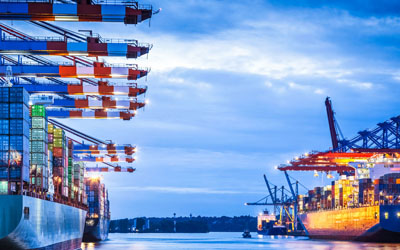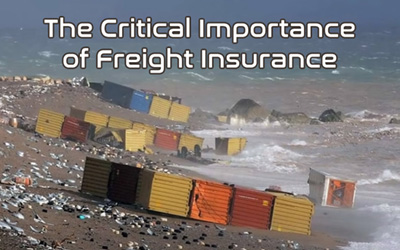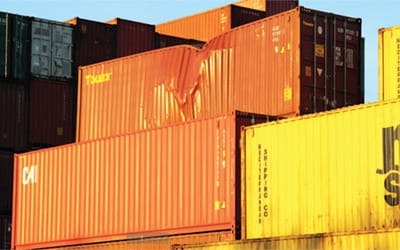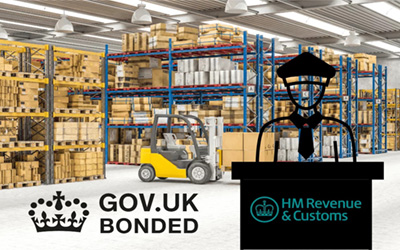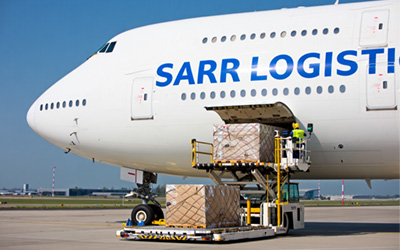Ocean Freight Questions Answered
If you’re new to the world of importing goods through ocean freight, it’s only natural to have a lot of questions. As international freight forwarders, SARR Logistics UK have heard and answered many of these questions from importers looking to bring their goods via ocean freight. Here, we’ll address the top 10 most common questions about shipping via ocean.
1. How Long Does It Take to Receive My Cargo?
Shipping times can vary due to multiple factors, including the shipment’s origin, destination, and whether you’re shipping a less than container load (LCL). Typically, for goods imported from major Chinese ports to Los Angeles or Long Beach, you can expect a journey of approximately two weeks at sea.
However, this doesn’t mean your goods will be in your hands within 14 days. Once they reach the port, they need to be unloaded, clear customs, and then be delivered to your doorstep. LCL shipments require extra time due to consolidation and de-consolidation processes at container freight stations.
2. Why Do Shipping Rates Change?
 Shipping rates can fluctuate due to several factors:
Shipping rates can fluctuate due to several factors:
General Rate Increase (GRI): Ocean carriers often raise rates in specific trade lanes, and a GRI typically happens on May 1st, marking the beginning of a new 12-month contract season between shippers and carriers.
Supply and Demand: Rates can increase during peak seasons, such as the traditional peak season from July to October and before the Lunar New Year when many Asian factories shut down, causing a surge in cargo and rates.
Cost of Oil: Changes in oil prices impact shipping rates, reflected in the bunker adjustment factor (BAF), which covers bunker fuel used in vessels.
To stay informed about rate fluctuations, it’s advisable to work with a reputable international freight forwarder who can keep you updated on market conditions, such as SARR Logistics UK Colchester Essex.
3. Do I Need Insurance?
While you’re not obligated to purchase marine cargo insurance, it’s highly recommended. Just like home or car insurance, marine cargo insurance safeguards you against potential damage, loss, theft, non-delivery, and more during transit. Importantly, it can protect you from “General Average” situations, where cargo is sacrificed to save a voyage, and all cargo owners share the loss, even if your cargo wasn’t directly affected.
This is something that we can help you with, and is seen as part of the service we offer. Just ask when you are making your enquirer and we will advise you of the best cover for your shipment. Just like everything else prices fluctuate through out the year so it is always advisable to ask for the most recent prices when gaining your quotation.
4. Should I Let My Supplier Handle the Shipment?
While it might seem easier to let your supplier manage the shipment, whether import or export there are disadvantages. Compliance and control become issues. If your supplier handles shipping, you might face compliance problems, such as Importer Security Filing (ISF) errors. Communication issues with overseas freight forwarders can make coordination and deliveries challenging.
As your business grows, managing multiple suppliers becomes complex. Therefore, it’s often better to have control by using your own international freight forwarder, Like SARR Logistics UK who can offer efficient shipping solutions and tracking tools.
5. Air or Ocean Import: Which Is Better?
The choice between air and ocean depends on your cargo’s urgency. If speed is crucial, air freight is faster but more expensive. Ocean freight is cost-effective for most shipments, with exceptions for lightweight or perishable goods. Consider the environmental impact too; air freight has a much larger carbon footprint compared to ocean. Here at SARR Logistics UK we take pride in corporate social responsibility and work together with our agents for green solutions for a greener future.
6. How Many Pallets Fit in a Container?
 The number of pallets a container can hold depends on their size. Generally, a 20′ container accommodates around 9 to 11 pallets, while a 40′ container holds approximately 21 to 25 pallets. Container dimensions are a critical factor in determining pallet capacity. For a full guide on container specifications please see our guide.
The number of pallets a container can hold depends on their size. Generally, a 20′ container accommodates around 9 to 11 pallets, while a 40′ container holds approximately 21 to 25 pallets. Container dimensions are a critical factor in determining pallet capacity. For a full guide on container specifications please see our guide.
7. Is There a Weight Limit?
Yes, weight limits vary depending on your shipping method. Ocean freight usually has fewer weight restrictions compared to domestic freight due to lorry weight limits and road haulage regulations. Lorry weight limits can range from 38 tonne to 44 tonne based on container size and government laws. Tri-axle chassis may be used for heavy loads. For a full explanation on wights and lorry sizes please see a simplified guide to lorry types and weights.
8. Why Do I Need a Power of Attorney (POA)?
A Power of Attorney (POA) is essential when hiring a customs broker, granting them the authority to conduct customs business on your behalf. It’s also required when submitting your Importer Security Filing (ISF) to U.S. Customs.Timely and accurate ISF submission is crucial to avoid fees and penalties.
This is an essential part of the shipping process mainly for the states, however all of this is taken care of by us as we are well versed in customs and all the documentation required, we take the headache out of custom clearance for you.
9. When Should I Import FCL vs. LCL?
If you have a large shipment to import, Full Container Load (FCL) is often preferable to reduce costs, minimize handling damage, and expedite delivery. If your shipment is less than 15 cubic meters (CBM), shipping Less than Container Load (LCL) is more cost-effective, due to it being a consolidation load. For further info on FCl and LCL please see our shipping page.
10. Why Are the Commercial Invoice and Packing List Important?
Customs requirements make commercial invoices and packing lists vital. The commercial invoice details the transaction between the exporter and importer, affecting duties and taxes. The packing list focuses on the physical count and breakdown of the shipment, aiding in cargo inspection, insurance claims, and inventory reconciliation.
Conclusion
In conclusion when you are running a business it is hard enough to keep up with the daily challenges which face all managers and directors. We all have days when you have a list of things to do, you get to the end of the day and find all you have done is deal with problems and actually not achieved anything from your list.
This is where freight forwarders come into their own as they take the stress out of your import and export needs, knowing your goods are not going to get delayed and be delivered on time will leave you free to get on with the important things like keeping your customers happy.
If you have more questions about importing goods via ocean, feel free to reach out to us for answers to your ocean freight inquiries.


